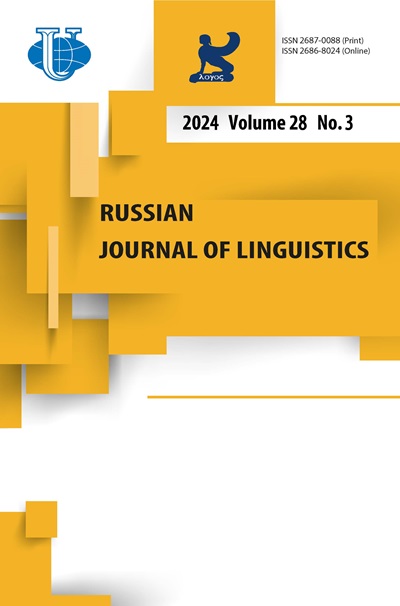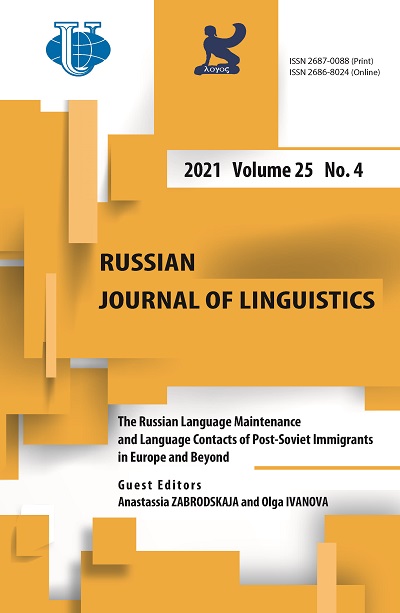Нормализация новой языковой иерархии: Эвентонимы в постсоветском городском пространстве
- Авторы: Смагулова Ж.1, Мадиева Д.2
-
Учреждения:
- Университет КИМЭП
- Казахский национальный университет имени аль-Фараби
- Выпуск: Том 25, № 4 (2021): Сохранение русского языка и языковые контакты постсоветских иммигрантов в Европе и за ее пределами
- Страницы: 1004-1023
- Раздел: Статьи
- URL: https://journals.rudn.ru/linguistics/article/view/29734
- DOI: https://doi.org/10.22363/2687-0088-2021-25-4-1004-1023
Цитировать
Полный текст
Аннотация
Практики именования не только раскрывают идеологическое противостояние в конкретном сообществе, но и способствуют дискурсивному построению новой социальной реальности. Однако преобразующая роль практики именования как семиотического ресурса для переосмысления языковой иерархии была малоизучена. Целью данного социоономастического исследования является анализ меняющихся идеологических предпосылок и семиотических механизмов нормализации новой языковой иерархии в постсоветском городском пространстве. Для этого описываются изменения в названиях различных общественных мероприятий, которые являются более гибкими и часто недолговечными по сравнению с такими названиями, как топонимы, антропонимы или торговые марки. В исследовании анализируется 1246 уникальных эвентонимов, упомянутых в местной русскоязычной газете «Вечерний Алматы» за период с 1989 по 2019 гг. Результаты показывают снижение использования русского языка для создания названий. Дальнейшее изучение выявило устойчивый рост неинтегрированных эвентонимов на казахском и английском языках в русскоязычных газетных текстах; в более поздних текстах мало примеров перевода и транслитерации, нет примеров транскрипции или заимствований. Данный сравнительный анализ показывает, что в контексте многоязычного Алматы нарушение пуристских норм стандартного русского языка стало новой нормой. Мы утверждаем, что эти новые локальные стратегии именования и использования имен представляют собой семиотический механизм символического доминирования; они работают на нормализацию новой языковой иерархии, в которой русский язык больше не является единственным доминирующим кодом общественного и официального домена. Наше исследование вносит вклад в понимание дискурсивной силы именования в процессе изменения языковых практиках.
Ключевые слова
Об авторах
Жулдыз Смагулова
Университет КИМЭП
Автор, ответственный за переписку.
Email: juldyz@kimep.kz
ORCID iD: 0000-0002-2179-9152
доцент и декан факультета образования и гуманитарных наук
Проспект Абая 2, Алматы 050010, КазахстанДинара Мадиева
Казахский национальный университет имени аль-Фараби
Email: dinara.madiyeva@gmail.com
ORCID iD: 0000-0001-8217-5047
докторант
Улица Карасай батыра 95, Алматы А05E3В3, КазахстанСписок литературы
- Ainiala, Terhi. 2016. Names in Society. In Carole Hough (ed.), The Oxford Handbook of Names and Naming, 371-381. Oxford: Oxford University Press
- Akzhigitova, Assel & Sholpan Zharkymbekova. 2014. Language planning in Kazakhstan. The case of ergonyms as another scene of linguistic landscape of Astana. Language Problems and Language Planning 38 (1). 42-57
- Alisharieva, Akbota, Zhanar Ibrayeva & Ekaterina Protassova. 2017. Kazakhstanskii russkii: Vzglyad so storony. Ab Imperio 4. 231-263. (In Russ.)
- Allerton, David. 1987. The linguistic and sociolinguistic status of proper names: What are they, and who do they belong to? The Journal of Pragmatics 11 (1). 61-92
- Backhaus, Peter. 2009. Rules and regulations in linguistic landscaping: A comparative perspective. In Elana Shohamy & Durk Gorter (eds.), Linguistic Landscape: Explaining the Scenery, 157-172. New York: Routledge
- Basovskaya, Evgenia. 2011. The concept of ‘language purism” in the Soviet newspaper propaganda. Synopsis of Doctorate Dissertation. Moscow: Russian State Humanities University. URL: http://cheloveknauka.com/kontsept-chistota-yazyka-v-sovetskoy-gazetnoy-propagande#ixzz6QB0ltob3 (accessed 06 May 2021)
- Ben-Rafael, Eliezer, Elana Shohamy, Muhammad Amara & Nira Trumper-Hecht. 2006. Linguistic landscape as symbolic construction of the public space: The case of Israel. International Journal of Multilingualism 3 (1). 7-30
- Bissenova, Alima. 2017. The fortress and the frontier: Mobility, culture, and class in Almaty and Astana. Europe-Asia Studies 69 (4). 642-667.
- Blommaert, Jan. 2013. Semiotic and spatial scope: Towards a materialist semiotics. In Norbert Pacher (ed.), Multimodality and Social Semiotics, 29-38. Oxford/New York: Routledge.
- Bourdieu, Pierre. 1991. Language and Symbolic Power. Cambridge: Polity Press.
- Charmaz, Kathy. 2006. The power of names. Journal of Contemporary Ethnography 35 (4). 396-399.
- Edelman, Loulou. 2009. What’s in a name? Classification of proper names by language. In Elana Shohamy & Durk Gorter (eds.), Linguistic Landscape: Expanding the Scenery, 141-154. London: Routledge
- Ermolovich, Dmitry. I. 2001. Imena Sobstvennye na Styke Yazykov i Kul'tur. Moscow: Valent. URL: http://e-repa.ru/files/translation/ermolovich-names-pt1.pdf (accessed 06 May 2021) (In Russ.)
- Fairclough, Norman. 1995. Critical Discourse Analysis: The Critical Study of Language. London: Longman.
- Cenoz, Jasone & Durk, Gorter. 2006. Linguistic landscape and minor languages. International Journal of Multilingualism 3 (10). 67-80.
- Giraut, Frederic & Myriam Houssay-Holzschuch. 2016. Place naming as dispositif: Toward a theoretical framework. Geopolitics 21 (1). 1-21.
- Gorham, Michel. 2000a. Natsiia ili snikerizatsiia? Identity and perversion in the language debates of late-and post-Soviet Russia. The Russian Review 59 (4). 614-629.
- Gorham, Michel. 2000b. Mastering the perverse: State building and language “Purification” in early Soviet Russia. Slavic Review 59 (1). 133-153. https://doi.org/10.2307/2696907
- Gorter, Durk. 2006. Introduction: The study of the linguistic landscape as a new approach to multilingualism. International Journal of Multilingualism 3 (1). 1-6.
- Hult, Francis. 2018. Language policy and planning and linguistic landscape. In James Tollefson & Miguel Perez-Milans (eds.), The Oxford Handbook of Language Planning and Policy, 333-349. New York: Oxford University Press
- Kasuya, Keisuke. 2001. Discourses of linguistic dominance: A historical consideration of French language ideology. International Review of Education 47 (3/4). 235-251
- Kozlova, Daria. 2019 (November 12). “We can lose our country!” Mosgorduma has discussed purity of the native tongue”. Novaya Gazeta. URL: https://novayagazeta.ru/articles/ 2019/11/12/82704-tak-stranu-poteryat-mozhno (accessed 06 May 2021)
- Landry, Rodrigue & Bourhis, Richard. 1997. Linguistic landscape and ethnolinguistic vitality: An empirical study. Journal of Language and Social Psychology 16 (1). 23-49
- Laitin, David. 1998. Identity in Formation, the Russian-Speaking Populations in the Near Abroad. Ithaca, NY: Cornel University Press
- Lieberson, Stanley. 1984. What's in a name?... Some sociolinguistic possibilities. International Journal of the Sociology of Language 45. 77-87
- Manan, Syed Abdul, Maya David, Francisco Dumanig & Khan Naqeebullah. 2014. Politics, economics and identity: Mapping the linguistic landscape of Kuala Lumpur, Malaysia. International Journal of Multilingualism 12 (1). 31-50
- McDermott, Ashley. 2019. The Linguistic landscape of post-Soviet Bishkek. Region: Regional Studies of Russia, Eastern Europe, and Central Asia 8 (2). 227-255.
- Moore, Irina. 2014. Negotiating public space: Post-Soviet linguistics landscape in Kazakhstan. International Journal of Communication and Linguistics Studies 11 (4). 1-21.
- Moscovici, Serge & Gerard Duveen. 2000. Social representations: Explorations in Social Psychology. New York: Wiley.
- Nyambi, Oliver & Tedai Mangena. 2016. The way we name now: Postcolonial perspectives from South Africa. In Oliver Nyambi, Tendai Mangena & Charles Pfukwa (eds.), The Postcolonial Condition of Names and Naming Practices in Southern Africa, 1-18. New Castle upon Tyne: Cambridge Scholars Publishing.
- Olcott, Martha. 1995. The Kazakhs. Stanford, CA: Hoover Institution Press/Stanford University
- Pavlenko, Aneta. 2012. Transgression as the norm: Russian in linguistic landscape of Kyiv, Ukraine. In Durk Gorter, Heiko F. Marten & Luk Van Mensel (eds.), Minority Languages in the Linguistic Landscape, 36-56. Basingstoke: Palgrave Macmillan
- Pavlenko, Aneta & Alex Mullen. 2015. Why diachronicity matters in the study of linguistic landscapes. Linguistic Landscape 1 (1/2). 114-132
- Peteet, Julie. 2005. Words as interventions: Naming in the Palestine - Israel conflict. Third World Quarterly 26 (1). 153-172
- Poplavski, Michail. 2014 (June 19). Duma wants to punish for foreign words. BBC Moscow. URL: https://www.bbc.com/russian/russia/2014/06/140619_russian_language_duma_ cleansing_neologism (accessed 06 May 2021)
- Puzey, Guy. 2016. Linguistic landscapes. In Carole Hough (ed.), The Oxford Handbook of Names and Naming: People, Places, Perceptions and Power, 395-411. Oxford University Press.
- Rivlina, Alexandra. 2015. Bilingual creativity in Russia: English-Russian language play. World Englishes 34 (3). 436-455.
- Saparov, Arsene. 2017. Contested spaces: The use of place-names and symbolic landscape in the politics of identity and legitimacy in Azerbaijan. Central Asian Survey 36 (4). 534-554.
- Sato, Eriko. 2017. Translation across cultures: Domesticating/foreignizing cultural transplantation. In Agnieszka Pantuchowicz & Anna Warso (eds.), Culture(s) and Authenticity: The Politics of Translation and the Poetics of Imitation, 15-22. Frankfurt am Main: Peter Lang.
- Shohamy, Elana, Eliezer Ben-Rafael & Monica Barni (eds.). 2010. Linguistic Landscape in the City. Bristol: Multilingual Matters
- Smagulova, Juldyz. 2008. Language policies of Kazakhization and their influence on language attitudes and use. International Journal of Bilingual Education and Bilingualism 11 (3&4). 440-475
- Smagulova, Juldyz & Kara Fleming. 2020. Legitimizing national, striving cosmopolitan: Branding of post-Soviet city space in Almaty, Kazakhstan. In Irene Theodoropoulou & Johanna Tovar (eds.), Research Companion to Language and Country Branding, 163-182. London: Routledge
- Smagulova, Juldyz & Eleonora Suleimenova (forthcoming). Towards the post-Russian? Narrative adjustment among Kazakhstani teachers of Russian. In Olga Solovova & Sabina Vakser (eds.), Russian as a Transnational Language: Resonance, Remembrance, Renewal. Routledge
- Špackova, Stanislava. 2015. The impact of political changes on the use of Latin script in Russian texts. Opera Slavica XXV (2). 47-58. URL: https://digilib.phil.muni.cz/ bitstream/handle/11222.digilib/133949/2_OperaSlavica_25-2015-2_5.pdf?sequence=1 (accessed 06 May 2021)
- Venuti, Lawrence. 2003. The Translator’s Invisibility: A History of Translation. New York: Routledge
- Vigouroux, Cecile. 2001. Symbolic power of language. In Rajend Mesthrie (ed.), Concise Encyclopedia of Sociolinguistics, 610-612. Oxford: Elsevier
- Vysotskaya, Irina. 2010. “Our” and “Other’s”, or the interrelationship of Cyrillic and Latin. Lingvistika: Vestnik Nizhegorodskogo Universiteta im. N.I. Lobachevskogo 4 (2) 471-474. URL: https://cyberleninka.ru/article/n/svoyo-i-chuzhoe-ili-vzaimodeystvie-kirillitsy-i-latinitsy-v-sovremennom-reklamnom-tekste/viewer (accessed 06 May 2021) (In Russ.)
- Yavari, Yulia. 2017. Transcription as a one of the ways to reproduce realia in translation Vestnik of Tver State University: The Philology Series 2. 219-224. (In Russ.)
- Zabrodskaja, Anastassia. 2014. Tallinn: Monolingual from above and multilingual from below. International Journal of the Sociology of Language 228. 105-130

















